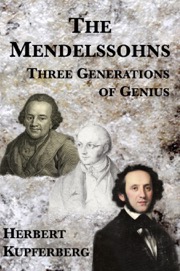 $9.99 on Kindle, Nook, Apple Books, Kobo, Google Play
$9.99 on Kindle, Nook, Apple Books, Kobo, Google Play(cover: Susan Erony)
The Mendelssohns: Three Generations of Genius by Herbert Kupferberg (83,000 words, 30 illustrations)
“For Herbert Kupferberg, the Mendelssohns are ‘the Rothschilds of culture.’ Their dynasty began with Moses, bright‐eyed hunchback from the Dessau ghetto who emigrated to Berlin and became one of the 18th century’s noted philosophers. The second generation was represented by sisters, Dorothea and Henrietta, who maintained literary salons and indulged in amatory adventures, and by Abraham, wealthy merchant who devoted much of his energies to furthering the career of his son Felix, one of the great composers of all time.
As might be expected of music critic, Mr. Kupferberg devotes nearly two‐thirds of his book to Felix. The facts of his life and work are skillfully retold and should be useful to anyone grown restless with the information on record jackets.
Much of the value of this book, however, derives from its attention to the dynasty as a whole, and particularly for what it tells about the Jewish Question in pre‐Hitler Germany. Moses sought, without notable success, to effect some sort of reconciliation with Germany within his Jewishness. Ambitious Abraham was baptized and had his children baptized. Felix had few qualms, when it served his purpose, about altering or falsifying his name to gain preferment. This point of vantage helps not only round out the picture of Felix but illuminates the ancient tension between the Jews and European culture. (To the Editor: I have no quarrel with your brief but sensitive comment on my book, ‘The Mendelssohns.’ However, it contains an error that does some injustice to the memory of Felix Mendelssohn. It was not Felix, but his father Abraham, who “had few qualms, when it served his purpose, about altering or falsifying his name to gain preferment.” Felix, as I tried to show, steadfastly resisted his father’s efforts to induce him to drop the family name, with its connotations of Judaism. Herbert Kupferberg New York City)” — The New York Times
“This is a very pleasing volume to read. Briefly described, it constitutes an insight into the family and times of all the Mendelssohns. It is truly a family history, but the social and cultural background of the three centuries involved is not at all slight and insignificant... an interacting fabric of family living in which the author has practically succeeded in making one feel a part of the Mendelssohn clan. Consequently, Fanny, Paul, Leah, Dorothea, and other lesser-known members of the family are important in their own right. They take on a living dimension in the narrative and are not mere background material. Interactions with Berlioz, Ferdinand David, Goethe, Heine, Hiller, the scientific Humbolts, Kant, Lavater, Lessing, Jenny Lind, the physicist Ohm, the philosophical Schlegels, Wagner, Queen Victoria, and Prince Albert — to name a few — are intriguing and present interesting vignettes of the times. The last segment of the book — the part on Felix and his generation — portrays a number of interesting facets of Felix’s personality... While most readers of this publication will be chiefly interested in the famous musical member of the triumvirate within the Mendelssohn family, we should not forget the other two members. Both their lives were legacies for Felix, and Kupferberg’s narrative skillfully depicts this.” — William J. Jones, Music Educators Journal
“[A]n interesting group biography.” — The Atlantic Monthly
“It’s a little difficult to justify the subtitle’s claim to genius for the second generation of this family... since Abraham, son of the famous Moses and father of the equally famous Felix, never saw himself as more than a ‘human hyphen’... But founding father Moses Dessau who became Mendelssohn after he left Dessau for Berlin was a notable merchant-scholar-sage, best remembered for his original work the Phaedon and his translation of the Bible. Of his six children, there was one certainly, Dorothea, more prominent than Abraham, an emancipated woman who became the mistress of Schlegel. Felix however takes up three-fifths of this book, from his precocious musical beginnings, to the elegant moments musicals he cut on his grand tour, to his later and happily domesticated life with Cecile and their many children... the work is respectably researched and straightforwardly written.” — Kirkus



